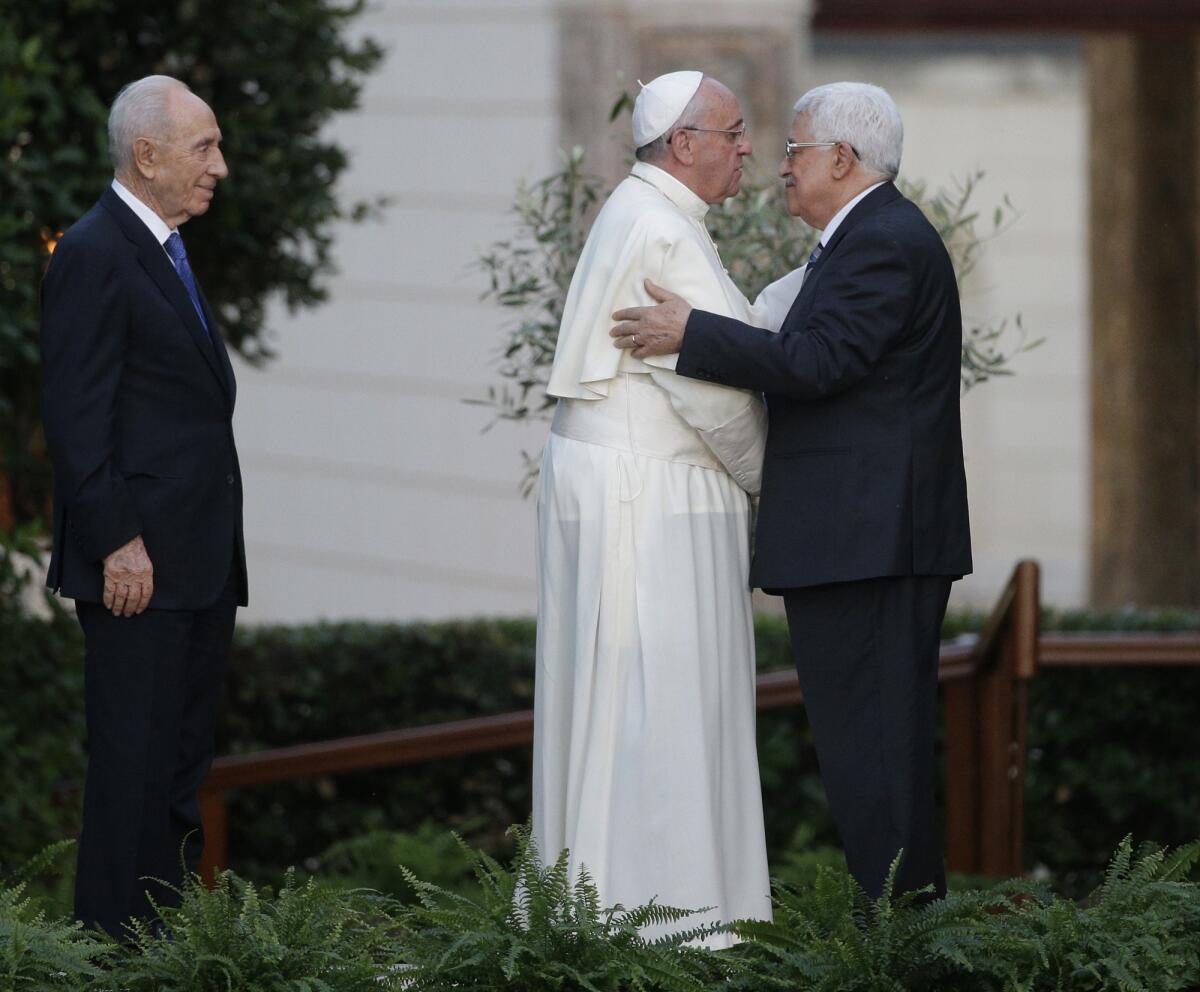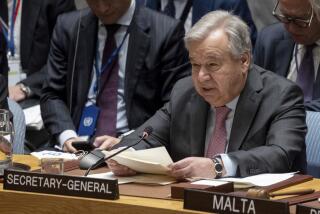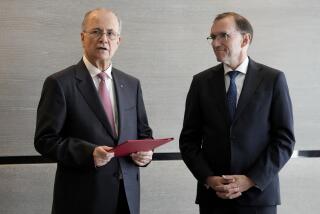Vatican recognizes ‘State of Palestine’

Pope Francis and Palestinian Authority President Mahmoud Abbas embrace last year at the Vatican. Israel’s President Shimon Peres is at left.
- Share via
Reporting from Jerusalem — The Vatican recognized Palestinian statehood in a treaty Wednesday, generating praise from Palestinians and criticism from Israelis, who said the move does not advance peace efforts.
An announcement from the Holy See on long-discussed bilateral issues with Palestinians said an agreement was reached with the “State of Palestine,” a change from the Roman Catholic Church’s diplomatic recognition of the Palestine Liberation Organization.
“Yes, it’s a recognition that the state exists,” said the Rev. Federico Lombardi, the Vatican spokesman, according to the Associated Press.
Palestinian Ambassador to the Vatican Issa Qseieieh said the agreement concluded negotiations about “bilateral relations between Palestine and the Vatican on the political level” as well as other principles regarding the “status and rights of the Catholic Church in Palestine,” according to the official Palestinian news agency WAFA.
Palestinian Authority President Mahmoud Abbas on Friday plans to visit the Vatican, where he is expected to meet with Pope Francis as well as attend the canonization of two Palestinian nuns.
“We welcome the Vatican’s recognition of the State of Palestine as a genuine contribution to peace and justice,” said a statement from PLO leader Hanan Ashrawi. Expressing appreciation of what she called a “courageous and moral stand,” Ashrawi said she hoped that “countries that have not yet recognized Palestine will do so in the immediate future.”
Israeli Foreign Ministry spokesman Emmanuel Nahshon told The Times of Israel, “We’re disappointed by the decision taken by the Holy See. We believe that such a decision is not conducive to bringing the Palestinians back to the negotiating table.”
The Vatican’s formal recognition of a Palestinian state follows a United Nations General Assembly decision three years ago to recognize Palestine as a non-member observer state, which Palestinians celebrated as a significant step toward international recognition. The Vatican had welcomed the U.N. decision.
The announcement Wednesday came as Israeli Prime Minister Benjamin Netanyahu cleared what appeared to be the last hurdle before finalizing his new government after the country’s recent elections. The Knesset, the Israeli parliament, passed an amendment to legislation putting off restricting the size of Cabinet, allowing Netanyahu to make extra ministerial appointments to deliver political promises.
After struggling for nearly two months to form a new government despite a strong electoral victory, Netanyahu succeeded in forming a narrow coalition with the slenderest majority possible and his fourth government is set to be sworn in Thursday.
The latest developments signaled to Netanyahu the challenges his new government could expect in the international arena in the absence of renewed talks with the Palestinians for a peace agreement. The guidelines of Netanyahu’s new government do not commit to a two-state solution for Israelis and Palestinians; neither did the two previous ones.
Scheduled to take office Thursday, the new government does not appear particularly different from the previous one in terms of its mostly conservative, right-wing and pro-settlement members, most of whom object to a Palestinian state.
In addition to the Vatican news, International Criminal Court prosecutor Fatou Bensouda advised Israel to cooperate with the preliminary investigation she is conducting regarding Palestinian allegations of Israeli war crimes, cautioning that failure to provide the court with reliable information could lead her to decide whether to open an investigation based on allegations from the Palestinian side only.
The ICC opened a preliminary inquiry on Palestinian allegations of Israeli war crimes shortly after the Palestinians gained access to the international tribunal in April. Israel disputes the court’s jurisdiction over the Palestinian Authority because it isn’t a formal state, and believes Bensouda erred in opening a preliminary inquiry.
The Vatican news came as Palestinians converged in a big rally in the West Bank city of Ramallah to mark 67 years since their displacement upon the establishment of Israel, referred to by Palestinians as the Nakba, which is Arabic for “catastrophe.”
Some participants carried keys symbolizing the keys to the homes their parents and grandparents left after the outbreak of the war for Israeli independence in 1948, with hope of returning when hostilities ended.
Holding the key to his family’s former home in a destroyed village west of Jerusalem, Issam Saji, 23, a university student, said he would hold onto the key until he is able to return to his family’s home village.
“I inherited this key from my grandfather in the hope that one day I will achieve his dream and return to the home he had left after the Nakba,” he said as he marched to the center of Ramallah behind a military band in red uniforms playing nationalist music.
Israel strongly opposes the right of return to Israel for refugees and their descendants, saying this would change the demographic balance and render Jews a minority.
Special correspondents Sobelman reported from Jerusalem and Abukhater from Ramallah, West Bank.
More to Read
Sign up for Essential California
The most important California stories and recommendations in your inbox every morning.
You may occasionally receive promotional content from the Los Angeles Times.










